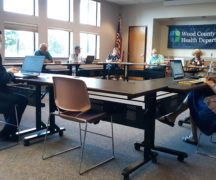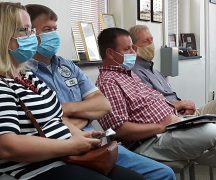By JAN LARSON McLAUGHLIN
BG Independent News
Hours into Gov. Mike DeWine’s stay-at-home order to slow COVID-19, and the Wood County Health Department is being flooded by calls from local businesses wanting to avoid shutting down.
“Our office has been inundated,” Wood County Health Commissioner Ben Batey said this morning during a conference call with county, municipal and township officials.
Local law enforcement and health departments have been charged with the job of enforcing the state’s order. In addition to ordering citizens to stay home, businesses are being asked to temporarily close down unless they provide an “essential” product or service.
Some of the local businesses calling the Wood County Health Department are clearly essential, Batey said.
But many others are not, he added.
“They can come up with all kinds of interesting arguments of why they are essential,” Batey said.
Businesses need to be putting public health before profits, he said.
“Is the function they are providing truly essential at this time? Is the service they are providing worth putting their employees at risk, or their customers at risk?” the health commissioner asked. “We’re asking them to do the right thing at this moment.”
Non essential businesses may suffer later if they insist on staying open now.
“Employees and customers are going to be judging them at this time,” Batey said. “They are going to have to live with that for a couple months or years.”
The goal of the stay-at-home order is to keep the spread of COVID-19 to a manageable level for hospitals.
“We need these businesses to do what we’re asking,” Batey said.
The health commissioners pointed out that automakers have already shut down operations – even though they could argue their work is essential.
“They are still closing down because it’s the right thing,” he said. “We want more businesses doing that.”
Under the state’s stay-at-home order, essential businesses include health care and public health operations, human services operations, essential governmental functions and essential infrastructure.
The order defines essential businesses that may operate during this time as:
- Grocery stores
- Stores that sell medicine
- Media organizations, such as newspapers, radio and TV news
- Organizations that offer charitable and social services
- Religious groups
- Gas stations and businesses needed for transportation
- Hardware and supply stores
- Building and construction trades
- Companies that sell business supplies needed for working from home
- Financial institutions
- Laundry services
- Restaurants that offer takeout, as long as consumption is completed off the restaurant’s premises
- Transportation providers
- Home-based care and services
- Residential facilities and shelters
- Professional services, such as legal services, accounting services, insurance services and real estate services
- Manufacturing, distribution and supply chain for critical products and industries
- Critical labor union functions
- Hotels and motels
- Funeral services
- Food, beverage, and licensed marijuana production and agriculture
- Post offices and other businesses that provide shipping and delivery services
- Educational institutions





